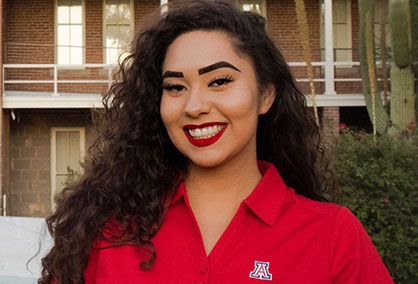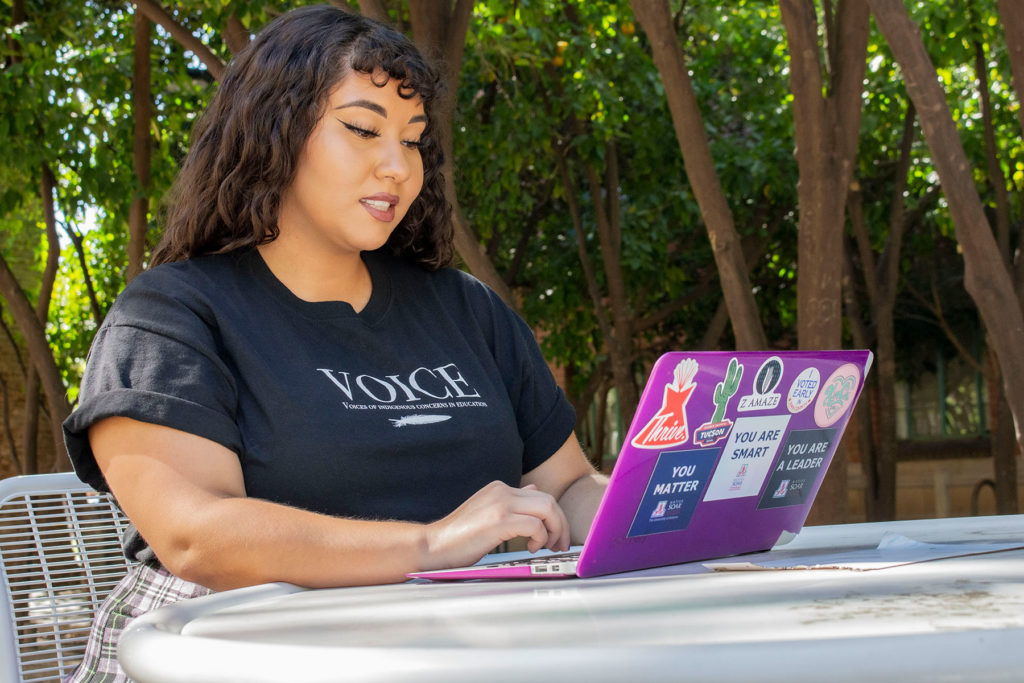
Trico scholarship student has a passion for science
 There are not many young women who spend their Saturdays out in the field or in the lab conducting research. Nadira Mitchell, a Trico Foundation scholarship recipient, has hiked into Sabino Canyon to collect data from wildlife cameras for her research project on human and animal interactions.
There are not many young women who spend their Saturdays out in the field or in the lab conducting research. Nadira Mitchell, a Trico Foundation scholarship recipient, has hiked into Sabino Canyon to collect data from wildlife cameras for her research project on human and animal interactions.
Nadira graduated with honors from Tucson High Magnet School in 2019. She is a junior at the University of Arizona majoring in Natural Resources/Wildlife Conservation with a goal of becoming a Wildlife Conservationist. She is also minoring in American Indian Studies.
Nadira said the Trico scholarship has allowed her to focus on school and research. “It has allowed me to have more time to do extracurricular activities and not worry about being in debt when I graduate,” she said.
One of those extracurricular activities is serving on the board of the Southern Arizona Research, Science and Engineering Foundation (SARSEF).
“Science is my passion and I have participated in research programs to gain skills in developing posters and presenting,” Nadira said. “Such opportunities helped guide me to be a better leader, advocate, and scientist because it is important to give back to the community and make the world better for future generations.”
She was surprised when SARSEF asked her to be on the board.
“They wanted someone with youthful experience,” she said. “Since I was part of SARSEF and benefited from SARSEF, it made sense. It’s taught me a lot about how non‑profits work. I care about SARSEF because it gave me so many opportunities and I want to see it grow and continue to benefit students.”
While in high school, Nadira spent four years educating guests of the Arizona‑Sonora Desert Museum about the native flora and fauna as a Junior Docent.
“As a Navajo, my passion for wildlife began as a toddler,” she said. “I was always fascinated by nature and being in the outdoors. During the monsoon season, I would go and spend time out in my front yard collecting snails. I have never been afraid of spiders or snakes like other kids because I knew as long as I respected them, they would not harm me.”
Her research and volunteer experiences influenced her decision to study Natural Resources/Wildlife Conservation at the U of A.
“I strive to learn about the scientific aspects of wildlife conservation, continue my research on wildlife habitats, become a better advocate for endangered species, and eventually manage a wildlife refuge in native communities,” she said.
Nadira is one of four students selected for the Doris Duke Conservation Scholars Program at the U of A. It’s a two-year program that gives students an opportunity to conduct their own research project focused on conservation. Nadira is researching how animals, specifically Javelina, navigate urban environments with differing levels of trash to inform land-use decisions and minimize human-wildlife conflict.
Nadira uses wildlife cameras and trash surveys to determine if trash levels decrease or increase the species richness and diversity of wildlife use of washes and residential areas.
“The consumption of human food and the packaging of waste can have adverse health effects on wildlife leading to death and a disruption in the natural food chain,” she said.
During her freshman year at the U of A, Nadira helped start the American Indian Student Initiatives, a club that focuses on environmental justice in Native American communities. Over spring break, the club partnered with the non-profit GRID Alternatives to build a solar panel system for a Navajo family.
“It was a cool opportunity to learn how solar works and how to build a solar panel system,” she said.
When the pandemic hit, the club had to get creative with their projects and outreach.
“We did four to five virtual seminars,” she said. “It gave people an opportunity to hear about issues such as the border barrier and how it is affecting the Tohono Oʼodham Nation.”
The club did a donation drive for the Baboquivari School District. They applied for grants and raised $3,100 to pay for temperature readings and hygiene supplies. “I’m proud of what we’ve accomplished,” she said.
Nadira is one of 93 students receiving a scholarship from the Trico Foundation. Scholarships are funded by Trico Members’ and past Members’ unclaimed or donated Capital Credit retirements. Click here to donate your Capital Credits.

 SmartHub Log-in
SmartHub Log-in